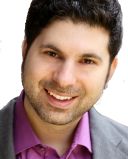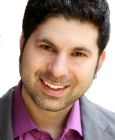Environment
The Nature of Genius III: The rich get richer, and the poor get poorer
How small genetic advantages can create large differences in ability
Posted July 29, 2008

On the planet Crithen live two best friends, Bo and Mo. Put bluntly, Bo was born with a slightly larger SchwingSchwang than Mo. (Note: A SchwingSchwang is roughly the equivalent of a deer's pair of antlers on Earth).
One day in gym class, Bo gets picked by the older kids for the SchwangSchlot team. Mo, without this slight early developmental genetic advantage, gets picked by a group of Schwang-Protected ‘Squigglers' (the equivalent of ‘nerds' on Earth). Bo uses his slightly larger SchwingSchwang to hit the balls slightly farther than Mo. More importantly, he learns tricks of the trade from the rest of the older Crithens. Mo, instead, learns about the latest FlimFlam (I won't even try to translate that one).
From this experience Bo is feeling pret-ty good about his slightly enlarged SchwingSchwang and milks this advantage for all its worth. He brags to all his friends in the schaga (i.e., locker room), starts hanging out with the older Crithens regularly, and plays an awful lot of SchwangSchlot with other very good players. Meanwhile, Mo only plays SchwangSchlot in gym class with the athletically challenged Squigglers, and gets worse every time.
Ten years later, a bunch of Schwang researchers (i.e., psychologists) come to the school and determine that genes are strongly correlated with SchwangSchlot ability and the environment has little effect. Bo hears about this study and it re-affirms for him what he already ‘knew' when he was just a wee Crithen: he was blessed with an enormous SchwingSchwang and is truly special. Only years later, when a blogger named Sartac (i.e., Scott) writes a piece referencing research showing how a small genetic advantage, through a lifetime of small events, can snowball into very large differences in competency does Bo remember all the environmental factors that, taken together, contributed significantly to his high ability for SchwangSchlot.
And that, in a nutshell, is a description of converging lines of research on two related effects-- the Matthew effect and the multiplier effect.
The Matthew effect is named for the biblical aphorism, "For to him who has shall be given and he shall have abundance; but from him who does not have, even that which he has shall be taken away (Matthew 25:29, King James Version)." Keith Stanovich [1] has done a lot of research on the Matthew Effect, particularly looking at reading ability.
According to Stanovich, the child who starts off reading well, or has been put in a position early to accumulate a large vocabulary, will read more, learn more, choose friends who are also good at reading, ask for more books, receive more books and ultimately read better as a result. The child with a lower vocabulary will read slower, gain less enjoyment from reading, not construct such a reading-enriched environment, and as a result the gap between the two children will become greater and greater. There is some empirical support for this idea. In one study, while a Matthew effect wasn't found for reading per se, the study found that "a child with a mean IQ for Grades 1-5 of 80 would be expected to show a decrement of -1.1 per year, while a child with a 140 IQ would tend to show an increase of about 4.5 points a year" [2, p. 903].
But how does the Matthew effect work? To answer this question, we have to turn to the Multiplier effect.
The Multiplier effect explains how a small advantage, genetic or circumstantial can lead a youngster to self-select stimulating environments which foster even further gains in that ability. Thus the environment can take even a tiny advantage and "multiply" it again and again as such interactions are reiterated through the course of one's development. The other side of the coin is also possible, of course. A slight disadvantage can lead a youngster to avoid situations where that difficulty would be revealed and they would be embarrassed. Since those situations are the same ones that would provide them with the opportunity they need to practice the task and make up for their disadvantage, they miss the boat entirely while their peers sail off ahead of them.
This idea plays a role in various research programs [3].
The bio-ecological model of abilities describes how the multiplier effect can operate on slight genetic proclivities [4]. According to this model, genotypic proclivities can get ramped up by successively more differentiated interactions with the environment. As a result, people can end up differing greatly in their abilities even when the underlying difference between their genetic proclivities is only very slight.
This basic idea is also central to chaos models, in which "tiny differences in input could quickly become overwhelming differences in output" [5]. This is often referred to as the "butterfly effect" (see the blog "chaotic life" for more on chaos theory).
Finally, the idea also figures in expertise models of deliberate practice. As I've noted, those with a slight genetic advantage practice more. Surely, this practice will play an important role in the development of an ability. According to these expertise researchers, the catalyst for the multiplier effect need not even be genetic. It could merely be a result of exposure to experience. I do believe however that for complex abilities that involve the interaction of many genes (see earlier post), genes almost surely play a role in whether or not one's genes are 'turned on' by experience.
I've left out one research program that is relevant to the multiplier effect. I will save that research program for my next post, because it opens up a whole different can of worms. You'll see what I mean.
This concludes my 'mini-series' on the nature of genius in which I described the complexities of genes and the subtle ways genes can affect ability. It is my belief that researchers who make strong claims about the link between genes and ability should take into consideration the polygenic (multiply interacting, Part I), epigenetic (dynamic, Part II), and environmentally contingent (this post) nature of genes and their effects on abilities. While the nature-nurture dichotomy is black and white, I see the truth as much more colorful and beautiful.
References
[1] Stanovich, K.E. (1986). Matthew effects in reading: Some consequences of individual differences in the acquisition of literacy. Reading Research Quarterly, 21, 360-406.
[3] Ceci, S.J., Barnett, S.M., & Kanaya, T. (2003). Developing childhood proclivities into adult competencies: The overlooked multiplier effect. In R.J. Sternberg and E.L. Grigorenko (Eds.), The Psychology of Abilities, Competencies, and Expertise. Cambridge, UK: Cambridge University Press.
[4] Bronfenbrenner, U., & Ceci, S.J. (1994). Nature-nurture reconceptualized in developmental perspective: A bioecological model. Psychological Review, 101, 568-586.
[5] Gleick, J. (1987). Chaos: Making a new science. New York: Viking Penguin, Inc.
Check out these additional papers for more evidence on the Matthew Effect:
Bast, J., & Reitsma, P. (1998) Analyzing the development of individual differences in terms of Matthew Effects in reading: Results from a Dutch longitudinal study. Developmental Psychology, 34, 1373-1399.
---
Note: I would like to express my gratitude to the work of Stephen Ceci for influencing many of my conceptions of the role of genetics in determining abilities and competencies.
© 2008 Scott Barry Kaufman, All Rights Reserved




